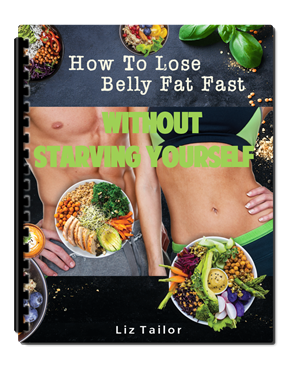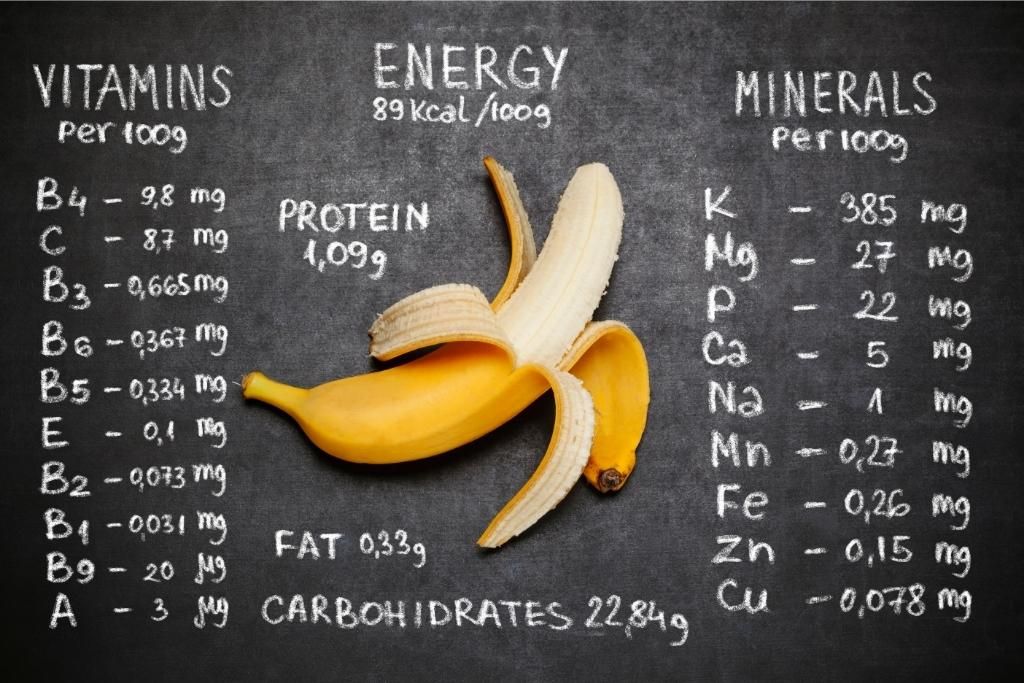If you’re like the majority of people who care about being healthy and living longer, at some point you’ve probably wondered why are vitamins and minerals so important.
Truth is, there’s a lot of contradictory and even outright false information floating around about vitamins and minerals.
This sea of unreliable information only serves to overwhelm and confuse you, which causes you to become mentally paralyzed.
When you’re overwhelmed, you typically don’t take action because you don’t know where to start due to the overabundance of options.
That’s why I’ve rolled up my sleeves and decided to write this short guide to hopefully clear up some of this confusion in a simplified manner.
Before we get started, let’s clear a few things up…
What This Guide Is Not
I will teach you some of the basic fundamentals about vitamins and minerals without all the extra fluff and filler.
I believe in getting straight to the point and providing you with the information so that you can apply it because more is not always better.
This guide is not an end-all-be-all about vitamins and minerals and is only meant to provide you with a great foundational understanding upon which you can build upon.
With that said, let’s jump in…
10 Reasons Why Vitamins and Minerals Are Important
Reason 1: Boost the immune system to fight off infections
Reason 2: Create enzymes
Reason 3: Create hormones
Reason 4: Repair cells
Reason 5: Cell growth
Reason 6: Energy production
Reason 7: Waste elimination
Reason 8: Regulates blood pressure and heartbeat rate
Reason 9: Builds strong bones and teeth
Reason 10: Improves nerve function
NOTE: Our bodies don’t produce vitamins and minerals which is why they are considered essential and must be consumed in the form of organic fruits, vegetables, meats, seafood, grains, nuts, seeds, high-quality supplements, and so on.
Vitamins and minerals work together to perform hundreds of functions in your body to help keep it healthy to sustain life.
What Are Vitamins?
According to Merriam-Webster, a vitamin is any of various organic substances that are essential in minute quantities to the nutrition of most animals and some plants, act especially as coenzymes and precursors of coenzymes in the regulation of metabolic processes but do not provide energy or serve as building units, and are present in natural foodstuffs or sometimes produced within the body.
There are a total of 13 vitamins that must be supplied through your diet in order to avoid deficiencies that can lead to health issues.
There are a lot of people who do not include enough natural vitamin sources in their diet and therefore suffer from a deficiency of one or more vitamins.
Examples Of Deficiency Symptoms

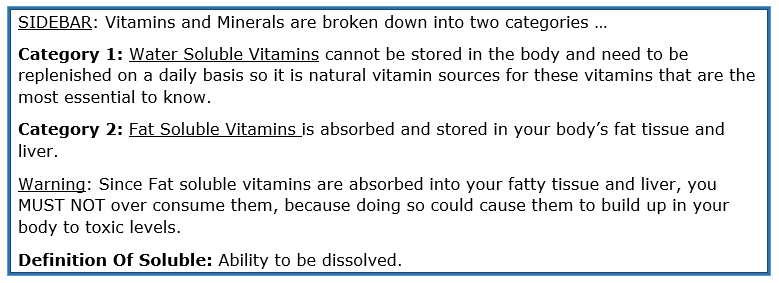
What Are Minerals?
According to dictionary.com a mineral is any of the inorganic elements, such as calcium, iron, magnesium, potassium, or sodium that is essential to the functioning of the human body and is obtained from foods.
To be more specific, minerals are used by your body for functions such as blood pressure and heartbeat regulation, creating enzymes and hormones, energy production, boosting the immune system, and tons more.
Minerals work in conjunction with vitamins to perform all those sophisticated functions in your body, which are necessary to sustain a healthy lifestyle.
Do Vitamins And Minerals Supplements Really Work?
Now here is a very controversial topic that has been the center of discussion for decades.
I may be very biased on this, but based on my experience and how I feel when I consistently consume vitamins and minerals supplements, I endorse them.
Let me be clear, if you’re going to take supplements, please do your research on the company and asked yourself the following questions:
1)) How long has the company been in business?
2)) Do they have more positive reviews than negative ones?
3)) Do they use high-quality ingredients?
4)) Do they test the purity of each ingredient in a high-tech lab?
5)) Do they source the best ingredients?
I highly recommend that you use those simple questions as filters before making any purchases.
Don’t let price alone be the determining factor in your purchase decision…
Just because a vitamins and minerals supplement is expensive doesn’t mean that it’s high quality.
On the flip side, a low-price supplement doesn’t necessarily mean that it’s of low quality.
Just like any other product, there’s always the potential for hype in the form of overpromising and underdelivering.
I’m a firm believer in not relying on supplements and trying your absolute best to get them from natural foods.
There’s no supplement that can provide better sources of vitamins and minerals than organic foods that are in their natural state.
But, high-quality supplements are the next best thing to fill in those gaps when you’re not able to obtain those vitamins and minerals through the foods that you consume for whatever reason.
Excerpt From An Article On WebMD:
Vitamins and other dietary supplements are not intended to be a food substitute.
They cannot replace all of the nutrients and benefits of whole foods.
"They can plug nutrition gaps in your diet, but it is short-sighted to think your vitamin or mineral is the ticket to good health -- the big power is on the plate, not in a pill," explains Roberta Anding, MS, RD, a spokesperson for the American Dietetic Association and director of sports nutrition at Texas Children’s Hospital in Houston.
It is always better to get your nutrients from food, agrees registered dietitian Karen Ansel. "Food contains thousands of phytochemicals, fiber, and more that work together to promote good health that cannot be duplicated with a pill or a cocktail of supplements."
Source: webmd.com/vitamins-and-supplements/nutrition-vitamins-11/help-vitamin-supplement
What Is The Recommended Daily Intake Of Vitamins And Minerals?
Keep in mind that these are mere guidelines and I highly recommend that you don’t exceed the upper tolerable limit (UL) in the form of vitamins and minerals supplements to prevent them from building up to toxic levels, especially the fat-soluble type.
RDA: recommended daily allowance (from all sources)
UL: upper tolerable limit (from supplements only)
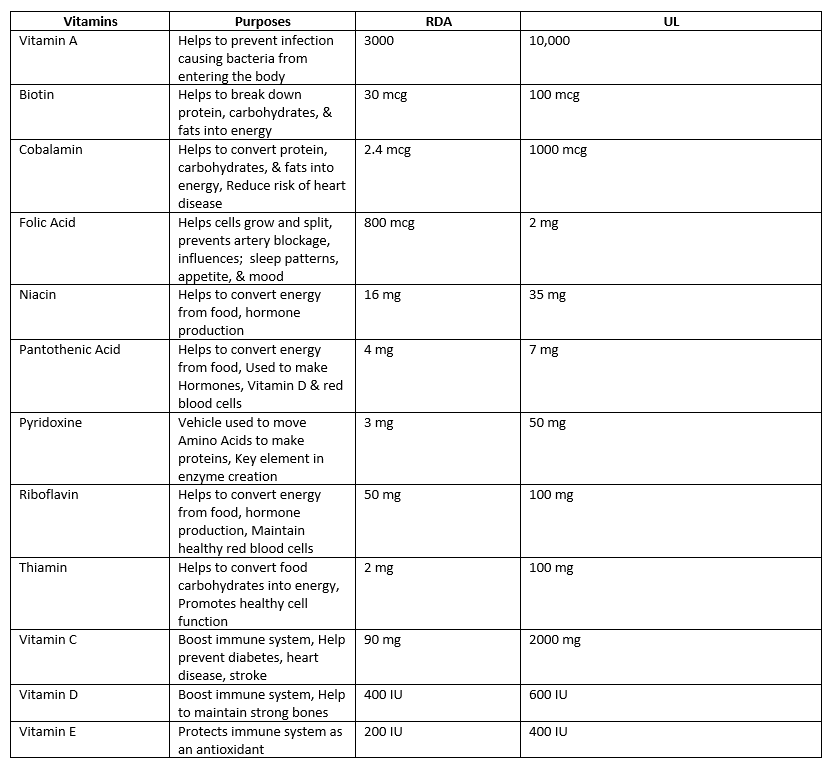
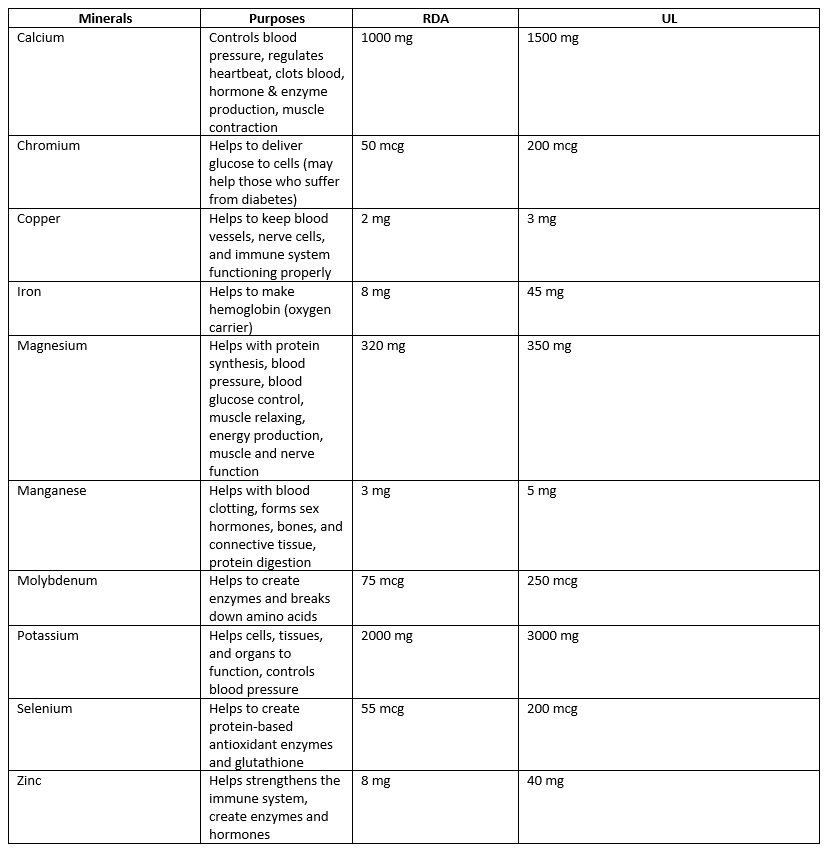
Conclusion
The whole point of The 5 Minute Guide To Understanding Vitamins And Minerals was to provide you with the fundamentals so that you'd be empowered with life-changing knowledge...
The knowledge forms the foundation upon which you build by learning more so that you can take action by applying simple changes to your diet that can allow you to consume these essential nutrients.
I don’t necessarily expect you to make a drastic 360-degree change overnight (unless you want to) from where you are now. Rather, at the very least, it would be extremely beneficial if you took the following baby steps and then build upon those:
STEP 1: Questions To Ask Yourself Before Consuming Any Type Of Food:
1)) What vitamins and/or minerals is this providing me?
2)) Is this food in its natural state or is it processed?
3)) Do I know what these ingredients listed on the label are?
You can also ask yourself, what foods can I consume that will provide me with all the essential vitamins and minerals?
As I mentioned earlier, I believe in high-quality supplements...
However, they must NOT be a replacement for the natural vitamins and minerals that you get by consuming organic foods.
Hence, this is why they are called supplements, not replacements.
STEP 2: Educate yourself on the food sources that provide all the essential vitamins and minerals so that you can begin implementing them into your daily diet on a conscious level instead of guessing.
The more conscious control you have over the foods you consume, the faster you’ll make positive progress on your health. The application of these small steps over time will add up to a more energetic and vibrant you. And who knows, you may increase your life expectancy.
I hope that you’ve enjoyed The 5 Minute Guide To Understanding Vitamins And Minerals and found it to be not only informative.
Download Our Free E-book!
